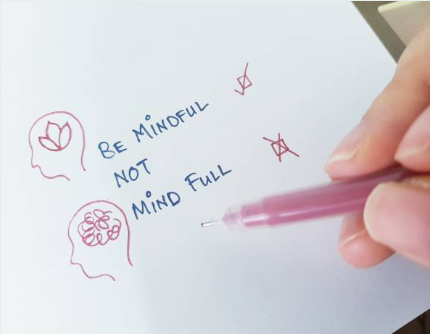How Self-Care Reduces Stress
Practicing self care can help you reduce stress. Whether you’re going through a rough time at work, or dealing with a stressful family situation, there are plenty of things you can do to reduce the stress in your life. This article will explore some ways you can start practicing self care right now.

Selfpause Affirmation App
Download the app to get 1,000’s of affirmation meditations and everything you need to write, record and listen to your own.
Exercise

Having a regular exercise routine can be a great stress reducer. It can also improve overall health and well-being, as well as boost your confidence levels. Exercise also helps you to sleep better.
Exercise may not be the first thing that comes to mind when thinking of stress-reducing activities. However, it’s no secret that exercise can have a calming effect on your mind, and is good for your body. Exercise also improves your mental alertness, reduces fatigue, and improves your cognitive function.
It’s also not surprising that a study found that physical activity can lower stress levels. The effects of exercise are especially useful when stress is depleting your energy.
One of the biggest benefits of exercise is that it can boost your productivity. Exercise makes you feel good, and you will be more productive when you are feeling well. In addition, exercise can help you improve your cardiovascular health, which will help you cope with stress.
There are many different types of exercise. For example, there are weight training exercises, aerobics, and jogging. In addition, you may want to incorporate yoga, Tai Chi, and other types of relaxation techniques into your routine.
Getting into shape is one of the most important things you can do for your health. It’s a great way to improve your cardiovascular health, strengthen your immune system, and reduce your chances of developing a variety of health conditions later in life.
Rest

Using self care as a coping mechanism can help you stay healthy. Not only does it improve your physical health, but it can also reduce stress and enhance your mood.
For example, taking a few minutes for self care can help to calm your nervous system, which in turn can improve your sleep. It can also improve your digestion, which can help your body fight off illness.
It’s no secret that stress is a part of life. However, high levels of stress increase the risk of developing chronic illnesses and unhealthy habits. Using self care is one of the best ways to fight off those stresses and stay healthy.
Self care is a practice that you should take into consideration whenever possible. Whether you’re trying to beat the winter blues, get through a stressful day at work, or simply make yourself feel better, taking care of yourself can help.
It can also help you to be a better caregiver to others. Studies have shown that taking care of yourself can increase your resilience. It can also lead to better relationships and a higher sense of well-being.
Self care can be anything that you enjoy doing. This could include learning a new language, taking a hike, or just enjoying a cup of tea with a friend. It’s also important to keep in mind that self care doesn’t have to cost a dime.
Mindfulness

Occupational stress is a common concern for health care professionals (HCPs), and mindfulness for self care can reduce stress. Mindfulness is defined as a quality of awareness in which the practitioner’s thoughts and actions are non-judgemental and accept the present moment without judgment. It can help patients, HCPs, and other people cope with adverse events and increase their resilience.
A number of studies have investigated the effects of mindfulness-based stress reduction (MBSR) on stress and burnout among health care professionals. Some studies have used abbreviated versions of the MBSR programme, and others have employed a more traditional model. This review aims to update the evidence on the effects of mindfulness-based interventions on HCPs.
Eight of the 18 studies that participated in this systematic review used the traditional MBSR model. The intervention consisted of eight to 10 meditation sessions per week, with the average time per week spent with the mindfulness teacher being 32 minutes. Some participants attended the training during their leisure time, and others attended it during their workday.
The results of these studies suggest that mindfulness-based stress reduction may be effective at reducing burnout, stress, and depression among HCPs. However, these results may not be generalizable to other groups of people.
The authors recommended that future studies evaluate the effects of mindfulness on different psychological constructs, and evaluate the effects of mindfulness on other factors associated with burnout.
Grounding yourself in times of acute stress

Using grounding techniques is a great way to calm down and reduce stress. It helps you connect with the present moment and reduces the chances of flashbacks. This strategy can also help you manage PTSD and panic attacks.
One way to practice grounding is through a breathing technique. It involves taking a slow, deep breath. Holding that breath for four seconds, and then exhaling. You can also do a box breathing technique, where you breathe in for four seconds, hold that breath for four seconds, and then exhale.
Grounding techniques are also effective in managing other types of anxiety, including panic attacks, depression, and PTSD. In these types of conditions, the emotions take over the physical responses. These emotions can also negatively affect your relationships, habits, and performance at work.
In times of acute stress, a person’s heart rate increases. Breathing shallowly can cause more stress. However, it’s also important to remember that too much stress can be harmful to both your physical and mental health. Creating a healthy lifestyle and spending time with friends and family can help decrease stress.
Another grounding technique involves using the senses. It involves focusing on elements in your surroundings. This can help you control your breathing and help you connect with the present moment.
Grounding exercises can be effective in helping people cope with anxiety and PTSD. However, they may trigger flashbacks in some people.
Avoiding unhelpful coping strategies

Using effective coping skills can reduce the negative effects of stressful situations on your mind and body. Avoiding unhelpful coping strategies may be a good way to start, but there are also other ways to ease your stress and make you more resilient to stress.
One of the coping strategies that may be the best for you is to make a list of things that are in your control. Getting help from a therapist can be another way to get help. A therapist can help you identify your stressors, learn to cope with them, and change your responses to stress.
Another good coping strategy is to talk to a friend. Your friend can help you to identify your stressors, make a list, and help you to address them. They may also be able to give you advice and check in to see if you have started a project.
Another coping strategy is to engage in a distracting activity. In many cases, distracting yourself can reduce your stress.
A third coping strategy is to seek social support. Some taxonomies of coping have classified this as a positive coping activity, but it doesn’t clearly represent a coping strategy.
In many cases, avoidance coping strategies are unhealthy. They can cause unintended consequences. Avoiding things is one thing, but avoiding thoughts and feelings can lead to increased distress over time.
Other coping strategies aren’t as effective as others. They may also not work in the long run.
Focusing on positive experiences

Getting your act together by taking care of yourself is a good idea for everyone. Having a good self care regimen will make you a better person to be around. Self care may include making time for leisure or making sure you get enough sleep. You may also want to consider joining a support group, which can help you to sort out your issues in a way that is both effective and enjoyable.
A little known fact is that many people suffer from low self esteem, burnout and even depression. Not taking care of yourself can lead to a myriad of health related problems, from sleep deprivation to substance abuse. In fact, recent events can cause you to fall prey to the depressing effects of stress. Getting your act together by taking care of yourself will help you maintain a healthy lifestyle. You’ll also be able to better care for others.
There are many different ways to do this. One of the more effective methods is to write down the best experiences you have had in the past. When you do this, you’ll be able to recall these experiences much more vividly in the future. The next time you’re feeling down in the dumps, recall a few of these memorable moments and you’ll be on the road to recovery in no time.
Another self care measure to consider is to take the time to listen to your own heart. This is a no brainer when you consider that a little bit of quiet can do wonders for your mental health.
Our Top FAQ's
Some examples of self-care activities that can help reduce stress include exercise, getting enough sleep, eating a healthy diet, practicing mindfulness or meditation, spending time in nature, engaging in hobbies or activities that bring joy, and setting boundaries to protect personal time and energy.
Self-care can improve mental health and reduce stress by providing a sense of control, increasing feelings of self-worth and self-esteem, and giving an opportunity to relax and recharge. It can also help to improve mood and reduce feelings of anxiety and depression.
The long-term benefits of regularly practicing self-care include improved mental and physical health, increased resilience to stress, and a greater sense of overall well-being.
Yes, self-care can help prevent or reduce the negative effects of stress on physical health. Chronic stress has been linked to a range of physical health problems, such as heart disease, high blood pressure, and weakened immune system function. Engaging in self-care practices can help to alleviate stress and reduce the risk of these and other physical health problems.
Incorporating self-care into a daily routine can be challenging, but there are a few strategies that can help make it more sustainable: setting aside specific times for self-care activities, finding ways to make self-care activities enjoyable and engaging, seeking support from friends, family, or a therapist, and setting realistic goals and priorities. It can also be helpful to remember that self-care is not a one-time activity, but rather a continuous process of prioritizing personal well-being.
